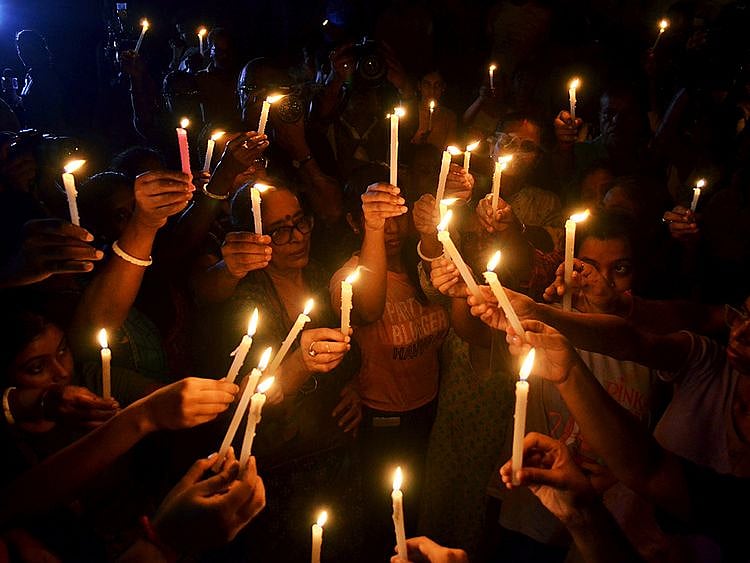To fix India’s rape problem, fix governance
Why tougher laws and expanded death penalty clauses aren’t curbing instances of rape

On 9 August, a 31-year-old trainee doctor’s body was found in a government teaching hospital. She had been raped, brutally assaulted and left to die. Over a month later, doctors continue to protest in Kolkata.
Every 10 years or so, there is a rape case that sparks massive protests in India, helping advance rape law and centre stage the discussion on preventing sexual violence.
The 1972 Mathura rape case led to protests in 1980 after the Supreme Court acquitted the accused of the argument that there was no evidence Mathura had resisted rape. This led to a law in 1983 that made sure this argument could no longer be made.
In 1992, Bhanwari Devi was gang-raped in a village in Rajasthan when she tried to stop child marriage. Protests over this case led to a Supreme Court judgement which provided guidelines on how to prevent sexual harassment at the workplace. These guidelines gave way to a law in 2013.
In 2012, the “Nirbhaya” rape case in Delhi resulted in non-stop protests for over a month across India, making global headlines. This case also resulted in stringent laws, making a second rape offence punishable by death, for example.
The RG Kar Medical College rape and murder case has led the West Bengal government to make its state rape laws tougher, allowing judges to award death penalty for rape for instance.
India already has a law criminalising violence against doctors. Protesting doctors want the punishment under the law to be made tougher, hoping it will act as a deterrent.
Who will bell the cat?
Yet there is a limit to how much changing the law can achieve. Laws can only be as good as their implementation. To solve India’s rape problem, India needs to fix governance.
There are two parts to this: prevention and punishment. The focus on making evermore punitive laws takes away from the need to focus on prevention. The RG Kar case has highlighted how unsafe hospitals can be for women doctors — and why just doctors? Nurses and women patients and women attendants of patients too.
How can someone commit rape and murder in a busy hospital and nobody notices? Hospitals, especially government hospitals, tend to be so busy, with everyone rushing around, that it is actually quite easy to commit a crime and get away with it.
The room where the crime was committed did not have CCTV — the hospital administration said that women often change clothes there. Yet the accused, Sanjay Roy, was arrested because a CCTV saw him enter and exit the room, and the police found his Bluetooth device left at the crime scene.
Doctors have highlighted the need for better and more secure rest areas for women doctors doing long shifts who often have to do night shifts. Young doctors can sometimes work for 24 hours or more at a stretch, getting some sleep whenever they can.
This obviously is a situation that needs security guards but the irony is that the accused was a security guard, a civic volunteer with the Kolkata Police.
Making complex workspaces such as hospitals safe for women is a design problem, a governance problem, an administrative problem.
When inadequate attention is paid to governance issues, they have multiplier effects. Somewhere some civic volunteer managed to bribe his way into an out-of-turn posting to get a better stipend … and ended up being a rapist and a murderer. The hospital didn’t see it fit to guard spaces of rest for women doctors with attentive women guards, and a young woman lost her life.
Who will police the police?
In Maharashtra’s Badlapur, two four-year-old girls were sexually assaulted by a male attendant while going to the toilet. The rules mandated the school to have a female attendant. Of course the CCTVs were not working. The parents alleged the police delayed filing of cases under a stringent 2012 law to protect children.
Who’s to ensure that schools are following the rules and hiring women attendants? Which regulatory authority will go around checking that CCTVs are working in schools and hospitals, without taking a bribe to sign off a dead camera as one that’s working?
Capital punishment isn’t going to fix these governance problems. On the contrary, it may act as an incentive to kill the rape victim so that the culprit has a better chance of escaping the law, with no one to identify him.
The punishment comes into play only after the police actually catch the culprit and do a thorough job of collecting evidence and then the government prosecution fights the case to win.
Last month in Agra, Uttar Pradesh, a 20-year-old woman had to undress in public as a protest against the police which were allegedly showing no initiative in arresting a man who she said had raped her.
She said she had been raped in a moving car on 10 August, filed a case on 11 August, and then personally met senior police officials regularly to press for the arrest of the accused, who was a student in Jammu.
For every case that catches media attention and shakes our conscience, there are hundreds of thousands of cases that don’t even get a single media report. Every case can’t become a rallying point, and stringent laws only help the police extort more money from the accused.
Governance and police reforms may be the key to fixing India’s rape problem — and indeed, law enforcement in general.
Network Links
GN StoreDownload our app
© Al Nisr Publishing LLC 2026. All rights reserved.